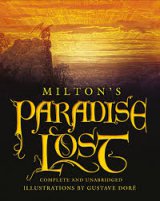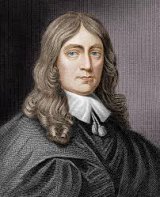Paradise Lost Page #19
Paradise Lost is an epic poem in blank verse by the 17th-century English poet John Milton. The first version, published in 1667, consisted of ten books with over ten thousand lines of verse. A second edition followed in 1674, arranged into twelve books with minor revisions throughout and a note on the versification.
O Hell! what doe mine eyes with grief behold, Into our room of bliss thus high advanc’t Creatures of other mould, earth-born perhaps, Not Spirits, yet to heav’nly Spirits bright Little inferior; whom my thoughts pursue With wonder, and could love, so lively shines In them Divine resemblance, and such grace The hand that formd them on thir shape hath pourd. Ah gentle pair, yee little think how nigh Your change approaches, when all these delights Will vanish and deliver ye to woe, More woe, the more your taste is now of joy; Happie, but for so happie ill secur’d Long to continue, and this high seat your Heav’n Ill fenc’t for Heav’n to keep out such a foe As now is enterd; yet no purpos’d foe To you whom I could pittie thus forlorne Though I unpittied: League with you I seek, And mutual amitie so streight, so close, That I with you must dwell, or you with me Henceforth; my dwelling haply may not please Like this fair Paradise, your sense, yet such Accept your Makers work; he gave it me, Which I as freely give; Hell shall unfould, To entertain you two, her widest Gates, And send forth all her Kings; there will be room, Not like these narrow limits, to receive Your numerous ofspring; if no better place, Thank him who puts me loath to this revenge On you who wrong me not for him who wrongd. And should I at your harmless innocence Melt, as I doe, yet public reason just, Honour and Empire with revenge enlarg’d, By conquering this new World, compels me now To do what else though damnd I should abhorre. So spake the Fiend, and with necessitie, The Tyrants plea, excus’d his devilish deeds. Then from his loftie stand on that high Tree Down he alights among the sportful Herd Of those fourfooted kindes, himself now one, Now other, as thir shape servd best his end Neerer to view his prey, and unespi’d To mark what of thir state he more might learn By word or action markt: about them round A Lion now he stalkes with fierie glare, Then as a Tiger, who by chance hath spi’d In some Purlieu two gentle Fawnes at play, Strait couches close, then rising changes oft His couchant watch, as one who chose his ground Whence rushing he might surest seise them both Grip’t in each paw: when Adam first of men To first of women Eve thus moving speech, Turnd him all eare to heare new utterance flow. Sole partner and sole part of all these joyes, Dearer thy self then all; needs must the Power That made us, and for us this ample World Be infinitly good, and of his good As liberal and free as infinite, That rais’d us from the dust and plac’t us here In all this happiness, who at his hand Have nothing merited, nor can performe Aught whereof hee hath need, hee who requires From us no other service then to keep This one, this easie charge, of all the Trees In Paradise that beare delicious fruit So various, not to taste that onely Tree Of knowledge, planted by the Tree of Life, So neer grows Death to Life, what ere Death is, Som dreadful thing no doubt; for well thou knowst God hath pronounc’t it death to taste that Tree, The only sign of our obedience left Among so many signes of power and rule Conferrd upon us, and Dominion giv’n Over all other Creatures that possesse Earth, Aire, and Sea. Then let us not think hard One easie prohibition, who enjoy Free leave so large to all things else, and choice Unlimited of manifold delights: But let us ever praise him, and extoll His bountie, following our delightful task To prune these growing Plants, & tend these Flours, Which were it toilsom, yet with thee were sweet. To whom thus Eve repli’d. O thou for whom And from whom I was formd flesh of thy flesh, And without whom am to no end, my Guide And Head, what thou hast said is just and right. For wee to him indeed all praises owe, And daily thanks, I chiefly who enjoy So farr the happier Lot, enjoying thee Preeminent by so much odds, while thou Like consort to thy self canst no where find. That day I oft remember, when from sleep I first awak’t, and found my self repos’d Under a shade on flours, much wondring where And what I was, whence thither brought, and how. Not distant far from thence a murmuring sound Of waters issu’d from a Cave and spread Into a liquid Plain, then stood unmov’d Pure as th’ expanse of Heav’n; I thither went With unexperienc’t thought, and laid me downe On the green bank, to look into the cleer Smooth Lake, that to me seemd another Skie. As I bent down to look, just opposite, A Shape within the watry gleam appeerd Bending to look on me, I started back, It started back, but pleasd I soon returnd, Pleas’d it returnd as soon with answering looks Of sympathie and love, there I had fixt Mine eyes till now, and pin’d with vain desire, Had not a voice thus warnd me, What thou seest, What there thou seest fair Creature is thy self, With thee it came and goes: but follow me, And I will bring thee where no shadow staies Thy coming, and thy soft imbraces, hee Whose image thou art, him thou shall enjoy Inseparablie thine, to him shalt beare Multitudes like thy self, and thence be call’d Mother of human Race: what could I doe, But follow strait, invisibly thus led? Till I espi’d thee, fair indeed and tall, Under a Platan, yet methought less faire, Less winning soft, less amiablie milde, Then that smooth watry image; back I turnd, Thou following cryd’st aloud, Return fair Eve, Whom fli’st thou? whom thou fli’st, of him thou art, His flesh, his bone; to give thee being I lent Out of my side to thee, neerest my heart Substantial Life, to have thee by my side Henceforth an individual solace dear; Part of my Soul I seek thee, and thee claim My other half: with that thy gentle hand Seisd mine, I yeilded, and from that time see How beauty is excelld by manly grace And wisdom, which alone is truly fair.
Translation
Translate and read this book in other languages:
Select another language:
- - Select -
- 简体中文 (Chinese - Simplified)
- 繁體中文 (Chinese - Traditional)
- Español (Spanish)
- Esperanto (Esperanto)
- 日本語 (Japanese)
- Português (Portuguese)
- Deutsch (German)
- العربية (Arabic)
- Français (French)
- Русский (Russian)
- ಕನ್ನಡ (Kannada)
- 한국어 (Korean)
- עברית (Hebrew)
- Gaeilge (Irish)
- Українська (Ukrainian)
- اردو (Urdu)
- Magyar (Hungarian)
- मानक हिन्दी (Hindi)
- Indonesia (Indonesian)
- Italiano (Italian)
- தமிழ் (Tamil)
- Türkçe (Turkish)
- తెలుగు (Telugu)
- ภาษาไทย (Thai)
- Tiếng Việt (Vietnamese)
- Čeština (Czech)
- Polski (Polish)
- Bahasa Indonesia (Indonesian)
- Românește (Romanian)
- Nederlands (Dutch)
- Ελληνικά (Greek)
- Latinum (Latin)
- Svenska (Swedish)
- Dansk (Danish)
- Suomi (Finnish)
- فارسی (Persian)
- ייִדיש (Yiddish)
- հայերեն (Armenian)
- Norsk (Norwegian)
- English (English)
Citation
Use the citation below to add this book to your bibliography:
Style:MLAChicagoAPA
"Paradise Lost Books." Literature.com. STANDS4 LLC, 2024. Web. 24 Nov. 2024. <https://www.literature.com/book/paradise_lost_101>.




Discuss this Paradise Lost book with the community:
Report Comment
We're doing our best to make sure our content is useful, accurate and safe.
If by any chance you spot an inappropriate comment while navigating through our website please use this form to let us know, and we'll take care of it shortly.
Attachment
You need to be logged in to favorite.
Log In